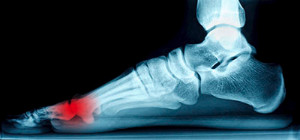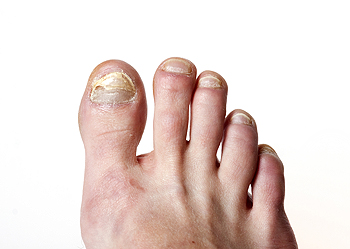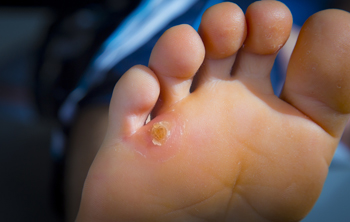September 2020
Ways to Help Prevent an Achilles Tendon Injury
 The Achilles tendon is found in the back of the leg, and it connects the calf muscles to the heel. Many patients experience an Achilles tendon injury from repetitive motion which may be caused by participating in running and jumping activities. Common symptoms include severe pain and discomfort while walking, and the foot may become swollen and feel weak. There are methods that can be implemented which may help to prevent an Achilles tendon injury. These can include performing specific stretches that can relieve tight calf muscles, and wearing shoes that fit properly. If you have pain in the heel and calf areas of your leg, it is suggested that you consult with a podiatrist who can guide you toward proper treatment techniques.
The Achilles tendon is found in the back of the leg, and it connects the calf muscles to the heel. Many patients experience an Achilles tendon injury from repetitive motion which may be caused by participating in running and jumping activities. Common symptoms include severe pain and discomfort while walking, and the foot may become swollen and feel weak. There are methods that can be implemented which may help to prevent an Achilles tendon injury. These can include performing specific stretches that can relieve tight calf muscles, and wearing shoes that fit properly. If you have pain in the heel and calf areas of your leg, it is suggested that you consult with a podiatrist who can guide you toward proper treatment techniques.
Achilles tendon injuries need immediate attention to avoid future complications. If you have any concerns, contact Dr. Robert Graser of Graser Podiatry and Bunion Surgery Institute. Our doctor can provide the care you need to keep you pain-free and on your feet.
What Is the Achilles Tendon?
The Achilles tendon is a tendon that connects the lower leg muscles and calf to the heel of the foot. It is the strongest tendon in the human body and is essential for making movement possible. Because this tendon is such an integral part of the body, any injuries to it can create immense difficulties and should immediately be presented to a doctor.
What Are the Symptoms of an Achilles Tendon Injury?
There are various types of injuries that can affect the Achilles tendon. The two most common injuries are Achilles tendinitis and ruptures of the tendon.
Achilles Tendinitis Symptoms
- Inflammation
- Dull to severe pain
- Increased blood flow to the tendon
- Thickening of the tendon
Rupture Symptoms
- Extreme pain and swelling in the foot
- Total immobility
Treatment and Prevention
Achilles tendon injuries are diagnosed by a thorough physical evaluation, which can include an MRI. Treatment involves rest, physical therapy, and in some cases, surgery. However, various preventative measures can be taken to avoid these injuries, such as:
- Thorough stretching of the tendon before and after exercise
- Strengthening exercises like calf raises, squats, leg curls, leg extensions, leg raises, lunges, and leg presses
If you have any questions please feel free to contact our office located in Boerne, . We offer the newest diagnostic tools and technology to treat your foot and ankle needs.
Sesamoiditis and Runners
 Sesamoiditis is a common condition among athletes, specifically runners. This condition can occur when there is inflammation present in the tendons of the foot. When sesamoiditis has developed, runners may experience pain in the balls of their feet. Some have described the condition as feeling like they have a rock stuck in their shoe. A sharp or burning sensation in the toe area can also be indicative of sesamoiditis. For a proper diagnosis, and advice on running techniques to prevent his condition, please speak with a podiatrist.
Sesamoiditis is a common condition among athletes, specifically runners. This condition can occur when there is inflammation present in the tendons of the foot. When sesamoiditis has developed, runners may experience pain in the balls of their feet. Some have described the condition as feeling like they have a rock stuck in their shoe. A sharp or burning sensation in the toe area can also be indicative of sesamoiditis. For a proper diagnosis, and advice on running techniques to prevent his condition, please speak with a podiatrist.
Sesamoiditis is an unpleasant foot condition characterized by pain in the balls of the feet. If you think you’re struggling with sesamoiditis, contact Dr. Robert Graser of Graser Podiatry and Bunion Surgery Institute. Our doctor will treat your condition thoroughly and effectively.
Sesamoiditis
Sesamoiditis is a condition of the foot that affects the ball of the foot. It is more common in younger people than it is in older people. It can also occur with people who have begun a new exercise program, since their bodies are adjusting to the new physical regimen. Pain may also be caused by the inflammation of tendons surrounding the bones. It is important to seek treatment in its early stages because if you ignore the pain, this condition can lead to more serious problems such as severe irritation and bone fractures.
Causes of Sesamoiditis
- Sudden increase in activity
- Increase in physically strenuous movement without a proper warm up or build up
- Foot structure: those who have smaller, bonier feet or those with a high arch may be more susceptible
Treatment for sesamoiditis is non-invasive and simple. Doctors may recommend a strict rest period where the patient forgoes most physical activity. This will help give the patient time to heal their feet through limited activity. For serious cases, it is best to speak with your doctor to determine a treatment option that will help your specific needs.
If you have any questions please feel free to contact our office located in Boerne, . We offer the newest diagnostic and treatment technologies for all your foot and ankle needs.
What are the Symptoms of Toenail Fungus?
 Toenail fungus is a contagious fungal infection, and can spread from wearing an infected person’s shoes or socks, and possibly from sharing towels. Toenail fungus lives and thrives in warm and moist environments, such as public swimming pools, locker rooms, and surrounding areas. Common symptoms that are often associated with toenail fungus can include the affected nail becoming yellow, thick, and brittle. In severe cases, the nail may lift off of the nail bed, and a new nail will gradually grow underneath it. If you see the beginning stages of toenail fungus, please speak to a podiatrist as quickly as possible so that the proper treatment can begin.
Toenail fungus is a contagious fungal infection, and can spread from wearing an infected person’s shoes or socks, and possibly from sharing towels. Toenail fungus lives and thrives in warm and moist environments, such as public swimming pools, locker rooms, and surrounding areas. Common symptoms that are often associated with toenail fungus can include the affected nail becoming yellow, thick, and brittle. In severe cases, the nail may lift off of the nail bed, and a new nail will gradually grow underneath it. If you see the beginning stages of toenail fungus, please speak to a podiatrist as quickly as possible so that the proper treatment can begin.
For more information about treatment, contact Dr. Robert Graser of Graser Podiatry and Bunion Surgery Institute. Our doctor can provide the care you need to keep you pain-free and on your feet.
Toenail Fungus Treatment
Toenail fungus is a condition that affects many people and can be especially hard to get rid of. Fortunately, there are several methods to go about treating and avoiding it.
Antifungals & Deterrence
Oral antifungal medicine has been shown to be effective in many cases. It is important to consult with a podiatrist to determine the proper regiment for you, or potentially explore other options.
Applying foot powder on the feet and shoes helps keep the feet free of moisture and sweat.
Sandals or open toed shoes – Wearing these will allow air movement and help keep feet dry. They also expose your feet to light, which fungus cannot tolerate. Socks with moisture wicking material also help as well.
If you have any questions please feel free to contact our office located in Boerne, . We offer the newest diagnostic tools and technology to treat your foot and ankle needs.
Proper Treatment for Corns
 Corns are thickened areas of dead skin that result from either pressure or friction. Corns are usually very small and can cause pain if they are located in a weight bearing area. They may feel like stepping on a pebble. Corns can also develop in between the toes and absorb the excess moisture, causing them to become soft and more vulnerable. Corns and warts can often be mistaken for one another, but they have very different treatments. Also, corn pads usually contain an acid that eats away at the healthy skin as well. Because of these issues, it is important to consult with a podiatrist for a proper diagnosis and treatment. Usually, the corn will be simply removed with relative ease.
Corns are thickened areas of dead skin that result from either pressure or friction. Corns are usually very small and can cause pain if they are located in a weight bearing area. They may feel like stepping on a pebble. Corns can also develop in between the toes and absorb the excess moisture, causing them to become soft and more vulnerable. Corns and warts can often be mistaken for one another, but they have very different treatments. Also, corn pads usually contain an acid that eats away at the healthy skin as well. Because of these issues, it is important to consult with a podiatrist for a proper diagnosis and treatment. Usually, the corn will be simply removed with relative ease.
If you have any concerns regarding your feet and ankles, contact Dr. Robert Graser of Graser Podiatry and Bunion Surgery Institute. Our doctor will treat your foot and ankle needs.
Corns: What Are They? and How Do You Get Rid of Them?
Corns can be described as areas of the skin that have thickened to the point of becoming painful or irritating. They are often layers and layers of the skin that have become dry and rough, and are normally smaller than calluses.
Ways to Prevent Corns
There are many ways to get rid of painful corns such as wearing:
- Well-fitting socks
- Comfortable shoes that are not tight around your foot
- Shoes that offer support
Treating Corns
Treatment of corns involves removing the dead skin that has built up in the specific area of the foot. Consult with Our doctor to determine the best treatment option for your case of corns.
If you have any questions please feel free to contact our office located in Boerne, . We offer the newest diagnostic and treatment technologies for all your foot and ankle needs.
Blog Archives
- July 2024
- June 2024
- May 2024
- April 2024
- March 2024
- February 2024
- January 2024
- December 2023
- November 2023
- October 2023
- September 2023
- August 2023
- July 2023
- June 2023
- May 2023
- April 2023
- March 2023
- February 2023
- January 2023
- December 2022
- November 2022
- October 2022
- September 2022
- August 2022
- July 2022
- June 2022
- May 2022
- April 2022
- March 2022
- February 2022
- January 2022
- December 2021
- November 2021
- October 2021
- September 2021
- August 2021
- July 2021
- June 2021
- May 2021
- April 2021
- March 2021
- February 2021
- January 2021
- December 2020
- November 2020
- October 2020
- September 2020
- August 2020
- July 2020
- June 2020
- May 2020
- April 2020
- March 2020
- February 2020
- January 2020
- December 2019
- November 2019
- October 2019
- September 2019
- August 2019
- July 2019
- June 2019
- May 2019
- April 2019
- March 2019
- February 2019
- January 2019
- December 2018
- November 2018
- October 2018
- September 2018
- August 2018
- July 2018
- June 2018
- May 2018









